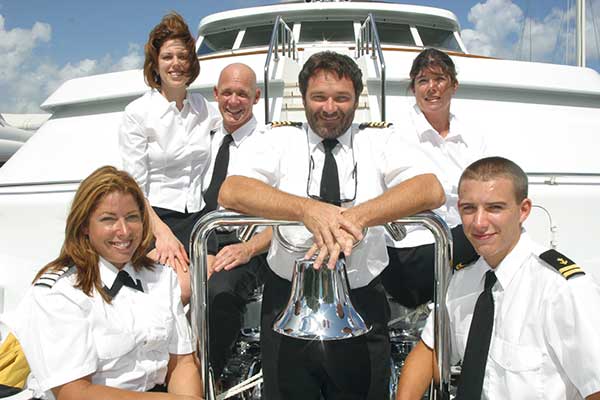

Yacht Crew Salaries: Complete Guide to What Yacht Crew Earn
It’s no secret that the impressive yacht crew salaries attract most people into the exclusive yachting world.
Junior deckhands or stewardesses can earn starting salaries of $3000 per month. With a few years of experience and some courses to back you up, this amount moves up towards $4000-$4500 per month!
In order to compile this superyacht crew salary guideline, I have taken 10 of the top yachting platforms and used all of their data, combined with my personal experience, to reach an average salary expectation for each position.
Table of Contents
How Much do you Make Working on a Yacht?

Yacht Captain Salary
- 20m-30m: $4000-$7500
- 30m-40m: $5500-$9500
- 40m-50m: $8000-$15000
- 50m-70m: $13000-$19000
- 70m+: $16500+
Requirements of a Yacht Captain
- Years of experience needed: 3-5 years of experience as Chief Officer/Mate and more than 5 years of experience as a Captain for larger yachts
- Minimum level of Qualification: 200ton licence which allows you to drive vessels below 200tons
The Captain has the highest level of responsibility onboard the yacht and hence they earn the most out of all the yacht crew salaries.
Captains are accountable for the overall safety of the yacht, crew members and guests.
They also handle daily operations of the yacht, guests, and owner liaison. They deal with management companies, port control, budgets, human resources, and many more tasks and logistics that make the job demanding and stressful.
On top of this, Captains are required to hold high levels of certifications depending on the size of the yacht they are driving.
Yacht Captain salaries can sky rocket with higher levels of qualifications.
If you are looking to become a Yacht Captain one day I recommend looking into the courses required so you can get started with licenses and sea time. It takes time to get there, but when you do it will be worth it.

Chief Officer Yacht Salary
- 30m-40m: $4000-$6000
- 40m-50m: $4500-$7500
- 50m-70m: $5500-$9000
- 70m+: $8000+
Requirements of a Chief Officer
- Years of experience needed: 3-5 Years
- Minimum level of qualification: Officer of the Watch
The Chief Officer is second in command to the Captain and is responsible for carrying out the Captain’s standing orders.
On smaller yachts, the Chief Officer is referred to as the Mate.
The Chief Officer is responsible for carrying out the safety duties onboard and assisting in the bridge with paperwork and navigational planning.
The Chief Officer is also responsible for leading and managing their deck team, ensuring crew are following their duties as well as managing the water sports and guest activities.
The salary of a Chief Officer depends heavily on the license held.

Bosun Yacht Salary
- Years of experience needed: 2-3 years
- Minimum level of qualification: Yacht Master Offshore
- A yacht Bosun salary can vary between $4000 and $6000.
Responsibilities of a Bosun
The Bosun is essentially the Lead Deckhand onboard. A lead deckhand salary on a larger vessel will be similar to that of a bosun salary on a smaller vessel.
This is an opportunity to step up from being a deckhand and gain some experience in a leadership role. This position is in place for larger yachts so that when the Officer is busy with bridge duties, someone is in charge on deck.

Yacht Deckhand Salary
Years of experience needed: 0
- Minimum level of qualification: None needed, however Power Boat Level 2 and Yacht Master offshore will put you at a great advantage
- Entry-level yacht crew salaries start at $3000 and can go as high as $4000/$4500.
Responsibilities of a Deckhand
A Deckhand is an entry-level role on a yacht.
You need to spend a few years (or less) as a Deckhand in order to learn and gain experience so that you can step up in the ranks and obtain your licenses.
This role will be very hands-on in maintaining the exterior of the yacht. Duties will include cleaning, polishing, varnishing, sanding, caulking, and any other maintenance work required.
Chief Steward / Chief Stewardess Salary
- 30m-40m :$4500-$5500
- 40m-50m :$5000-$7000
- 50m-70m- $5500-$8000
- 70m+: $7500+
Responsibilities of a Chief Stewardess/Steward
- Years of experience needed: 3-5 years
- Minimum level of qualification: Depending on the size of the vessel you may need courses such as Food Hygiene and Safety, Silver Service, WSET, or a Purser course
The Chief Stewardess or Steward is responsible for all the interior operations of the yacht .
They are responsible for managing the interior team, and ensuring the interior of the yacht is maintained to the highest standards. Besides cleaning and laundry schedules , this also includes provisioning for crew and guests, budgeting, accounting, and training of junior crew.

Steward or Stewardess Yacht Salary
- Minimum level of qualification: Depending on the size of the vessel you may need courses such as Food Hygiene and Safety and Silver Service
- Salaries start at $3000 and go up to $6000
Responsibilities of a Steward or Stewardess
A Stewardess/Steward is an entry-level position working within the interior of the yacht.
There are rankings within the interior (2nd, 3rd, 4th Steward/Stewardesses). As you spend more time in the industry, you will be promoted to higher ranks, and with that will come a better salary and more responsibility.
This role covers a range of tasks, including but not limited to housekeeping, laundry, bartending, table scaping, floral arrangements, serving, and hosting guests.

Engineer Yacht Salary
- 20m-30m: $4000-$5000
- 30m-40m: $4500-$6500
- 40m-50m: $6000-$8000
- 50m-70m: $7500-$11000
- 70m+: $9000+
Requirements of an Engineer
- Years of experience needed: 2-4 years in an engineering role onboard as Deck/Engineer or relevant land-based experience
- Minimum level of qualification: AEC
The Engineer onboard is responsible for all mechanical functioning and maintenance of the vessel. This is a very technical role that can pay well as you gain experience and obtain your licensing.
Yacht Chef Salary
- 20m-30m: $4000 – $5000
- 40m-50m: $5500 – $75000
- 50m-70m: $6500-$9500
Requirements of a Yacht Chef
- Years of experience needed: 3-5 years depending on previous experience
- Minimum level of qualification: Food Hygiene and Safety Level 2
The Chef is responsible for feeding the crew 2 to 3 healthy and sustainable meals a day. They are of course required to prepare meals for guests when onboard to the highest of standards.
In their day-to-day tasks, they will be responsible for their own provisioning of the galley, maintaining stocks, cleanliness, and hygiene of the galley.
The salary of the Yacht Chef varies depending on qualifications and experience.

Yacht Crew Salaries for Private vs Charter Yachts
There are two types of super yachts that require crew: Private and Charter yachts. The salaries for yacht crew differ slightly between the two.
Private Yacht
A private boat is owned by a single person or family who uses the yacht for their own purposes. They don’t charter it out and you can expect to have the same guests onboard for the duration of your contract.
The benefit of these programs is that you get to know your guests well so you may find it easier to manage their wants and needs.
You may also benefit from traveling to off-the-beaten-track locations as I have!
For yacht crew working on these private boats, you will usually not receive charter tips.
Charter Yacht
A charter boat is one that gets chartered out by guests. This operates as a business and also means you will have different guests for every trip.
If you work on a charter boat you can expect to receive charter tips at the end of each charter. These are usually 10%-20% of the charter fee!
Considering these tips can be anywhere from $2000-$5000 per week depending on the size of the yacht, charter boats offer great earning potential and can skyrocket your salary as a yachtie.

Hi, my name is Lisa, a Chief Stewardess in the yachting industry with 10 years of experience, as well as 8 years of hospitality experience prior to that. Being in the yachting industry has been a whirlwind of adventure, growth, challenges and some of the best experiences of my life, and I am excited to share my knowledge and experiences with all of you.
How to Write the Perfect Yacht CV [With Template]
A day in the life of a yacht stewardess.

- Career Advice
- Salary Guide
- Dockwalk Presents
- Digital Dockwalk
2023/2024 Superyacht Crew Salary Guide

Whether you’re continuing a long-standing career, climbing the career ladder, or getting your feet wet for the first time, Dockwalk ’s Salary Guide provides the full picture when it comes to crew compensation.
Salary is generally one of the top motivators for those looking for jobs in yachting, but it remains a closely guarded secret. Each year, the Dockwalk Salary Survey goes out to thousands of crewmembers and crew agencies across the world, gathering real-time salary feedback with the aim of creating greater transparency and understanding across the industry.
The 2024 Salary Survey is now open.
The Results of the 2023 Salary Survey
Our annual salary survey provided some unprecedented insights to what captains and crew earned in 2023.
The yachting industry is slowly returning to normal in the wake of the pandemic. Yachts are back to work around the world and many new ones are in the pipeline thanks to the surge in popularity the "social distant" yachting lifestyle has enjoyed. But, while this return to normalcy has opened up new crew jobs this year, crew themselves have been returning to the workplace in large numbers and competition has been fierce.
Many of the crew agents reported that crew wages largely are flat this year compared to last. Salaries went up in 2021 and 2022 when crew were in short supply, but now more crew are available than previously. While crew are demanding higher pay this year, they’re not necessarily receiving it, but some agents have seen salaries continue to rise since Covid. There are many factors that can affect the salary crew can expect, including where a yacht is based and the season.
The tables below show the “agency range,” which gives the average lows and highs of all ranges provided by the agencies, the “poll range,” where results from individual working captains and crew are tallied to show the lowest and highest of all the responses, and the “poll average” calculated from all the responses. Note that our figures do not account for longevity and experience, crew benefit packages, tips, or similar extra remuneration.
Not all positions with corresponding boat sizes had enough poll responses to be considered significant; those categories are marked with an asterisk to indicate if fewer than five crew responded in that size range for that position. Several categories had no or only one response, which is also noted.
To view the full table:
Dockwalk Salary Survey 2023 in USD and Euros
Impartial training and careers advice
Call us: +441983 280 641
+441983 280 641
Superyacht Crew Salary Guide – 2023
- Superyacht Crew Salary Guide – 202...
Working as a crew member on a Superyacht has some incredible perks…
… from being on the ocean and seeing new countries to brushing shoulders with the rich and famous and, of course, earning an amazing salary.
As we begin 2024, we thought it a good opportunity to look back at 2023 to see how the industry faired and whether there have been any changes to salary, tips, and working conditions.
The good news is that things have got better! Since the pandemic, the Superyacht industry has seen significant growth the industry has grown significantly over the last couple of years .
As the number of Superyachts being built increases, so does the demand for crew; there has never been a better time to enter the industry.
Typically, the entry-level salary for a Deckhand and Steward/ess ranges between €2,000 and €3,500, rising to €4,000+ for more senior roles. A Captain can make €10,000+ per month, depending on the size of the Superyacht!
Moreover, as you’ll be living onboard the yacht, there are no living expenses to worry about. Your meals are prepared by the Chef onboard, too, and you rarely need to buy groceries or toiletries.
We can’t talk about Superyacht Salary without mentioning tips. The majority of Superyacht owners charter their yachts as the ultimate holiday experience! A Superyacht does not come cheap, with some chartering for One Million per week! Guests normally leave a tip and around 10% of the charter fee, which is shared equally among the crew. It is not unheard of for a Deckhand or Steward/ess to receive a €5,000 tip after a week’s trip!
Another huge benefit contributing to the amazing Superyacht salary is the potential for tax-free earnings (typically paid in Euros)!
Read on for our complete guide to the Superyacht crew salary for 2023…
How much do you make working on a Superyacht?
In short, your salary will depend on the role you work in on the Superyacht, in conjunction with its size; however, the average salary is €2,500 per month (most boats pay in Euros rather than pounds).
Several other factors will determine Superyacht crew salary, too, including previous experience, qualifications, and extra skills (such as Dinghy Instructor, Carpenter, and Divemaster, to name a few).
Whether the yacht is chartered or privately owned will all contribute to your monthly pay packet; your basic salary will be the same whether you work on a charter yacht or a private boat, though on a charter, you will generally receive tips; this usually around 10% of your monthly salary, or it can range between €1,500 to €5,000+ .
We’ve shared current Superyacht salary approximations for 2023 in the table below:
How much do you make working on a yacht?
| Captain | €4,000-€7,000 | €7,000-€14,000 | €14,000+ | €16,000+ |
| First Officer | €3,000-€5,000 | €4,300-€5,700 | €6,000+ | €7,000+ |
| Bosun | €3,200-€4,500 | €4,000 | €5,000 | |
| Chief Stewardess | €3,000-€4,500 | €4,000-€6,000 | €6,000+ | €7,000+ |
| Experienced Stewardess | €2,800-€3,000 | €2,800-€3,500 | €3,500+ | €4,500+ |
| Experienced Deckhand | €2,800-€3,500 | €2,800-€4,000 | €3,500+ | €4,500+ |
| Junior Stewardess | €2,000-€3,000 | €2,000-€3,000 | €3,000+ | €3,000+ |
| Junior Deckhand | €2,000-€3,000 | €2,000-€3,000 | €3,000+ | €3,000+ |
| Chef | €3,000-€4,500 | €4,000-€7,000 | €6,000+ | €7,500+ |
Here’s a breakdown of Superyacht crew salaries in more detail by role:
Superyacht captain salary – €4,000 to €16,000+.
A Superyacht Captain is responsible for all activity onboard, crew safety and well-being, and the experience offered to guests.
The Captain is the owner’s main point of contact on the yachts; whether things are going right or wrong, it can be a highly pressured and stressful job.
The salary reflects the responsibility in this high-pressure environment, and the range in salary normally depends on experience and the boat’s length.
Generally, larger boats will carry more guests and staff; therefore, the Captain will have higher responsibilities, a bigger budget, and more challenges to cope with.
First Officer salary – €3,200 to €8,000+
The First Officer, also known as Chief Officer or Chief Mate, is always second in command to the Captain.
They will assist the Captain in a wide range of duties and tends to be responsible for the safety of the Superyacht and everyone on board. Furthermore, the role of the First Officer also includes bridge watches and navigation.
Due to needing a firm understanding of working on deck, the First Officer normally starts their career as a Deckhand and progresses from there.
If you are an experienced First Officer and have moved onto larger yachts, then your next step will be to become a Captain.
Superyacht Bosun salary – €3,200 to €5,000+
Otherwise known as the Senior Deckhand, the Bosun is the ‘line manager’ of all Deckhands on the boat. The responsibilities of the Bosun are to manage and maintain the exterior of the yacht to the highest order.
This role also includes spending time with the guests, making sure they are having fun and are safe on all the toys the Superyacht has, such as jet skis and dinghy sailing boats.
Chief Stewardess salary – €2,800 to €7,000+
The Chief Stewardess is responsible for the interior of the Superyacht. Attention to detail, elegance,
and cleanliness is paramount for this role.
Moreover, you will be required to perform duties discreetly and anticipate the requests and demands of guests, as well as manage your team of Stewardesses. A managerial background in hospitality will therefore help for this role.
Generally, the Chief Stewardess will have gained previous experience in an entry-level Stewardess role and fully understands the functions of a working Superyacht.
Superyacht Stewardess salary – €2,000 to €3,500+
This is an entry-level position working on board a Superyacht.
Open to Male and Female
Being a Superyacht Stewardess is a wide-reaching role covering three main areas: Service, Housekeeping, and laundry. Your actual day-to-day activities can vary depending on the type of yacht (private or charter), owner, and Itinerary. You will be the host, cleaner, florist, and housekeeper, and collectively responsible for looking after the guests 24/7.
If you are looking at not going to uni , and want a career with real progression and a very good salary, becoming a Superyacht Stewardess could be for you! If you would like to start a career as a Stewardess, then consider joining our Superyacht Steward/ess course.
Superyacht Deckhand salary – €2,000 to €3,500+
This is another entry-level role to work on a Superyacht.
Open to male and female
A very hands-on role, the Deckhand is responsible for the exterior of the yacht, and tasks will typically involve cleaning, painting, sanding, varnishing, and all general maintenance of the boat.
As with all Superyacht roles, working as a Deckhand requires some skills and qualifications before you start looking for work. The good news is that you don’t have to go to Uni to get whats required. You will be able to get qualified in a few weeks.
How to become a Superyacht Steward/ess or Deckhand.
If you want a career in the Superyacht Industry, we are here to help. Contact us by phone, email, or live chat. Alternatively, book a meeting with one of our career advisors.
Looking for more information on working in the Superyacht industry?
Download our free guide and learn all there is to know about working on a superyacht as a deckhand or steward/ess., related articles.
- Seafarers Tax
5 ways to ensure your SED claim is rock solid
The Seafarers’ Earnings Deduction, often referred to as the SED, is a tax legislation that enables seafarers to claim back their UK income tax. It a...
Do I need to pay off my Student loan if I work on a Superyacht?
Good question! First, let me say that the information below is aimed at people who have studied in the UK and took out a Student Loan to cover course ...
Have I got the right experience to work in yachting?
If you’re thinking about working on board a Superyacht, we share the skills and experience you need and how to get into the yachting industry in thi...

Yacht Crew Positions and Salaries
The organisational structure onboard a superyacht follows a strong hierarchy based upon a military model. Exact job duties and lines of authority are set and strictly adhered to. This hierarchy is followed on the vast majority of yachts; however, responsibilities of the crew on smaller yachts are often merged.
There are four departments on yachts with clear organisational structure:
- Deck (including Bridge) – Safety, passage delivery, maintenance of the yacht's exterior, guest outdoor activities
- Engineering – Safety and smooth operational running of the yacht
- Interior – Housekeeping, guest wellbeing, activities, accounting
- Galley – Food preparation, stock control, hygiene, galley maintenance
The top of the hierarchy on each yacht is the Captain , who reports to the yacht owner either directly, or through a representative or a yacht management company.
Salaries vary and depend on the yacht size, use, type and location, as well as the experience and qualification of the crew member. We included typical salaries of crew based on the data available from reputable industry sources, as well as our research of over 60,000 crew registered with us.
Deck Positions
The primary duty of the Captain is the overall safe manning and operation of the yacht. Yacht Captain is responsible for the vessel, yacht crew, owner and guests, including personnel management, shipyard/project management, legal and regulatory compliance, accounting, achieving owners' objectives, and answers to the owner regarding all decisions.
| Captain | €4,000 - €15,000 |
First Mate / Chief Officer
The First Mate or Chief Officer is the right hand of the Captain. Takes command of the yacht from Captain when required. Shares Captain's responsibilities as required.
| Chief Officer | €3,000 - €13,500 |
| 2nd Officer | €3,000 - €8,000 |
| 3rd Officer | €2,500 - €6,000 |
| Security Officer | €3,000 - €5,000 |
Bosun / Lead Deckhand
Bosuns are usually experienced Deckhands with additional responsibilities. They are in charge of Deckhands onboard the yacht and often spend a lot of time with guests during outdoor activities. The Bosun is normally the main tender driver.
| Mate | €2,500 - €6,000 |
| Bosun | €2,500 - €5,500 |
| Lead Deckhand | €2,500 - €5,000 |
Responsible for the maintenance of the exterior of the yacht and keeping it in pristine condition at all times. Deckhands also assist in maintaining, cleaning and operating yacht's tenders.
| Junior Deckhand | €2,000 - €3,000 |
| Carpenter | €3,000 - €4,000 |
Engineering Positions
Chief engineer.
Responsible for the Engineering Department and for all technical aspects of the boat and its equipment. The Chief Engineer's duties include overseeing all mechanical and electrical operations, ensuring all planned maintenance takes place and liaising with subcontractors.
| Chief Engineer | €5,000 - €15,000 |
Second / Third Engineer
The Second and Third Engineers report directly to the Chief Engineer. They assist in maintaining all mechanical and electrical operations of the yacht.
| 2nd Engineer | €3,000 - €10,000 |
| 3rd Engineer | €2,500 - €6,500 |
| Sole Engineer | €3,500 - €12,000 |
| Motorman | €2,500 - €4,000 |
ETO / AV/IT Officer
Electro-Technical Officer (ETO) and AV/IT Officer are in charge of daily maintenance of all electronic, computer, audio/visual and communications equipment and their efficient operation. This includes the radio, radar, telephones, satellite communications, navigation systems, computers, Internet connection, interior equipment (TVs, sound systems), etc.
| ETO | €4,000 - €8,000 |
| AV/IT Officer | €4,000 - €7,000 |
Electrician
The Electrician is responsible for maintenance of all electrical circuits onboard the vessel, circuit breakers, switches, lighting, batteries, etc.
| Electrician | €4,000 - €6,500 |
This is an administrative position on large yachts. The Purser is responsible for all operations in the interior department, including inventory, purchasing, provisioning, accounting, organising guest activities, and assisting the Captain with the yachts paperwork.
| Purser | €5,000 - €9,000 |
Chief Steward(ess)
Duties are similar to those of other Steward(ess)es onboard the boat, but on a more senior level, including managing the interior department and training. Small yachts with less crew do not have a Purser. The Chief Steward(ess) is in charge of all the responsibilities normally carried out by the Purser on large yachts.
| Chief Steward(ess) | €4,500 - €8,500 |
| Interior Manager | €4,000 - €8,000 |
| Head of Servicer | €4,000 - €7,000 |
| Head Housekeeper | €3,000 - €5,500 |
| Spa Manager | €3,500 - €5,500 |
Steward(ess)
Steward's or Stewardess's main responsibility is to maintain the interior of the yacht and provide the highest standard of care to the owner and guests. They serve food and drinks, prepare guest activities, pack and unpack luggage and are on call for anything that the guests want anytime day or night. On some yachts, they help the deck crew moor the yacht.
| 2nd Steward(ess) | €3,000 - €6,500 |
| 3rd Steward(ess) | €2,500 - €4,000 |
| Spa Steward(ess) | €3,000 - €4,000 |
| Service Steward(ess) | €2,500 - €5,000 |
| Housekeeping Steward(ess) | €2,500 - €4,000 |
| Laundry Steward(ess) | €2,500 - €4,000 |
| Sole Steward(ess) | €3,000 - €6,000 |
| Junior Steward(ess) | €2,000 - €3,500 |
| Butler | €3,500 - €6,000 |
| Stew/Deck | €2,500 - €4,000 |
The Head/Executive Chef onboard a luxury superyacht is a culinary trained professional responsible for the overall management of the galley department on larger yachts, including guest and crew meals, provisioning, food safety, maintaining strict hygiene standards and financial/budgetary administration.
| Head Chef | €6,000 - €10,000 |
Assists the Head Chef in all aspects of galley duties. The Sous Chef may be required to independently provide crew meals or guest meals at the direction of the Head Chef.
| Sous Chef | €3,500 - €8,000 |
Crew Chef / Cook
Large yachts employ a separate crew and guest chef. The Crew chef provides meals for the crew.
| Crew Chef / Cook | €3,000 - €5,000 |
| Sole Chef | €3,500 - €9,000 |
| Stew / Cook | €2,000 - €4,500 |
Other Positions
Many yachts, especially the large ones, have several additional positions. These are often combined with primary roles, e.g. Stewardess / Masseuse or Deckhand / Dive Instructor . The most common are:
| Beautician | €3,000 - €4,000 |
| Hairdresser | €3,000 - €4,000 |
| Massage Therapist | €2,000 - €4,500 |
| Nurse | €3,000 - €4,500 |
| Dive Instructor | €3,000 - €6,000 |
Career Advice:
Email address:
Remember me Forgotten password?
Password Reset
Enter your email address and we will email you a password reset link.
Email address:
Essential Guides
Ocean Mapping
New to Yachting
- Mar 11, 2021
Salary is generally one of the top motivators when choosing a job onboard a yacht, yet it is usually one of the best-kept secrets within the industry.
When negotiating the final salary, it's important that both the employer and employee have an idea of what the standard is for that particular position. This will help keep the transparency and build trust.
To keep their finger on the pulse of the industry and understand the changes that are happening within, YPI CREW set off to launch the yachtingsalaries. com website in 2016. There, every crew member in the industry is welcome to enter their yacht crew salaries along with the position they serve on a yacht. The process is completely anonymous and serves as a way of monitoring the industry's yacht crew salary movements. Yacht crew can also visit the site to check the anonymous data their peers have entered for reference.
The Importance of Yacht Crew Salaries Reports
Informed employers recognise that in order to attract the top level of talent and experience for a particular role, one of the strongest influences they have is the salary they can offer. To stay competitive within the yachting industry you have to offer competitive yacht crew salaries that reflect the current marketplace. And in order to do this, you have to know what the current market rate is.
Equally, employees can use a yacht crew salary report such as this as a guide point to get an idea if a job offer is reflective of the industry and the role they serve.
The Crew Salaries Data and How We Collect It
In 2016, YPI CREW launched a peer-to-peer salary comparison website for the yachting industry. Here, anyone working in the industry is welcome to anonymously enter their yacht crew salary along with their rank.
has so far attracted over 5.655 entries since its launch in 2016, providing an informative yacht crew salary guide for employers and employees. Best of all, the salary data is free for anyone to access.
The figures shown here are median values of the real salaries entered by yacht crew. They can be used as orientational figures but the real salary offered during the recruitment process will vary depending on the candidate's experience, training, certificates, and additional skills. This is why, when looking for work, it's important to have someone guiding you and championing your skills and experience.
All yacht crew salaries are expressed in euros. Please note that the blanks in the graphs are due to either lack of entries for that particular category or the nonexistence of a role in a specific segment. For example, there are generally no third officers on yachts smaller than 50 meters.
To visit the site to contribute your salary or conduct a free search of the salary database, visit
Data presented here is collected from anonymous yacht crew members. It should not be seen as a definite portrayal of the current market but merely an informal indication.
As salary data is entered by members of the community the site works on an honesty system. There is really no incentive for contributors to mislead people about what they earn. Any inflated or inconsistent salary entries can be 'flagged' as suspicious by other members of the community or by YPI CREW and quickly removed from the system to ensure the accuracy of data is maintained.
Yacht Captain Salaries
347 captains have contributed their salaries. Of those, 287 (82%) are working on motor yachts and 60 (18%) on sailing yachts. This is coherent with the ratio of the global world yacht fleet. 83% of which are motor yachts and 17% are sailing yachts. Overall, only 33% of captains who contributed are on rotation. Rotation usually, if and when available, starts on yachts over 50m. When talking about sailing yachts, we didn't receive any entries for sailing yachts above the 51-65m segment. Also, salaries were on average slightly lower on sailing yachts compared to same-sized motor yachts.
Yacht Captains present the most senior management of a yacht, which is obviously reflected in the salary they command. Expectedly, with the size of the yacht increasing, so do salaries.
Experienced recruiters are invaluable at this level as they can definitely add value in the salary negotiation stage; it is their role to act as a middle person to ensure that, when a job offer is made, it is to all parties' satisfaction and is therefore accepted. They not only know how best to champion captains, their skills and experience at interview stage; they help craft and finesse a deal.

2020 Yacht Crew Salaries for Motor Yacht Captains

2020 Yacht Crew Salaries for Sailing Yacht Captains
Deck Crew Salaries
214 Deck Crew have contributed their salaries, broken down as 116 Chief Officers, 16 Second Officers, 12 Third Officers, and 64 Deckhands.
From the data, we see that fewer Chief Officers (43%) reported having a rotational position compared to Second Engineers (57%). However, they reportedly benefit more from rotation than Captains who are at 33%.

2020 Yacht Crew Salaries for First or Chief Officers

2020 Yacht Crew Salaries for Second Officers

2020 Yacht Crew Salaries for Third Officers or Bosuns

2020 Yacht Crew Salaries for Yacht Deckhands
Engineer Salaries
279 technical crew have contributed; 162 Chief Engineers, 60 Second Engineers, 16 Third Engineers, and 25 ETO/AVIT.
Overall, many more Engineers reported being on rotation than Captains. We see that 72% of Chief Engineers, 57% of Second Engineers and 56% of Third Engineers are rotational, along with 88% of ETO/AVIT Engineers.
For Chief Engineers we note that beyond the 66 – 80m segment, there is no data for permanent salaries. This reflects the engineering recruitment market where in fact, from +65m upwards, the market is rotation only, apart from a few exceptions. The same goes for Second Engineers and ETOs where permanent contracts on +65m yachts are for build contracts only. It is our experience that the market is rotation-only for Engineers on operational yachts over 65m.

2020 Yacht Crew Salaries for Chief Engineers

2020 Yacht Crew Salaries for Second Engineers

2020 Yacht Crew Salaries for Third Engineers

2020 Yacht Crew Salaries for ETO, AVI & Electrical Engineers
Chef Salaries
65 yacht Chefs contributed with their salaries, of which 50 were Head Chefs and 15 Sous Chefs.
It is our experience that at the point of recruitment on yachts +50m, most yacht Chef jobs offer some sort of rotation, so it surprising that only 26 % of Chefs who contributed are on rotation.

2020 Yacht Crew Salaries for Yacht Head Chefs

2020 Yacht Crew Salaries for Sous Chefs
Pursers & Stews
34 Pursers, 61 Chief Stews, and 22 Second Stews contributed their salaries.
Pursers, after Engineers, are the category who most have access to rotation. 59% of Pursers reported having rotation whilst only 18% of Chief Stews said they benefit from that perk.
Our experience is that in the past year, perhaps due to Covid-19, salaries offered to Stews were somewhat lower than the year before.
This underlines again the added value of registering and teaming up with recruiters who have their fingers on the pulse and are able to assist in negotiating the best conditions for job offers. Each situation is unique. Likewise, the same recruiters will advise Captains on the state of the crew market and how to position themselves in terms of conditions and salary to attract the best suitable, interested and available candidates

2020 Yacht Crew Salaries for Yacht Pursers

2020 Yacht Crew Salaries for Chief Stews and Stewardesses

2020 Yacht Crew Salaries for Second Stews and Stewardesses

2020 Yacht Crew Salaries for Yacht Stews and Stewardesses
Most read articles

Tips & Tricks
How many crew members are needed on a yacht?

How to Find A Caribbean Yacht Job

Yacht Job Offers
Open Yacht Crew Jobs In April 2024

How to Become A Yacht Purser: Interview with Purser Trainer Angela Wallace

YACHT CREW GUIDES
IS YACHTING THE RIGHT CHOICE FOR ME?
Essential yacht guides

Mandatory certificates

What you need to know about B1/B2 visa

How to prepare for a yacht interview?
Read more latest news

YPI CREW Announces its 2024 Superyacht Recruitment Market Report

Embarking on an Engineering Career in Yachting: Crafting Your CV

YPI CREW is a proud sponsor of the ‘Seas the Day’ Ocean Rowing Team

YPI CREW Yacht Crew Salaries Report 2020
INDUSTRY NEWS

HOW TO WRITE A MEMORABLE YACHTING CV

YACHT CREW SALARY GUIDE
Error 404 — page not found, we’re sorry, we couldn’t find what you were looking for.
Please return to the YPI CREW homepage
Let’s get started. Call us on +33 (0)4 92 90 46 10 or email us.
Our mission, vision and values, mlc 2006 compliance, essential guides, yacht crew positions.
Chief Officer
Second Officer
Third Officer
Chief Engineer
Interior Crew
Head of Service
Head of Housekeeping
Specialist Positions
Spa Manager
Spa Therapist
Personal Trainer & Yoga Instructor
Hairdresser
Mandatory Certificates
B1/b2 visa information, how to write a memorable cv, how to prepare for an interview, yachting seasons, yacht crew salary guide, is yachting the right choice for me, cv templates, ocean mapping, new to yachting.
+33 (0)4 92 90 46 10
Loading, please wait...

Yacht Crew Salaries: An Informative Overview
August 28th 2023
For individuals considering a career in the yachting industry, understanding the potential earnings is crucial. This article aims to provide a comprehensive overview of yacht crew salaries, taking into account the various roles within a yacht's crew and factors that might influence these salaries.
How Much Do Yacht Crews Get Paid?
Yacht crew salaries are contingent on a range of factors, including the size of the yacht, its operation type (private or charter), the individual's role on the yacht, and their level of experience.
For entry-level positions, such as Junior Steward(ess) or Deckhand, salaries can range from €2,000 to €3,500 per month, as per the data provided by our friends at YPI Crew . As crew members gain experience and progress in their careers, salaries can increase significantly. For instance, a Bosun could earn up to €4,500 per month, while a yacht Captain's salary can range from €7,000 to €30,000 per month, depending on the size of the yacht they are responsible for.
How Much Do You Get Paid Working on a Yacht in the UK?
In the United Kingdom, the average pay for yacht crew is competitive with other parts of the world. However, as always, salaries can vary. Deckhands may start their careers earning around €2,000 per month, while a Chief Steward(ess) or Steward(ess) can expect to earn up to €7,500 per month. For a more accurate view of current salary scales, you can refer to the latest job offerings on SOVREN Crew's job listings .
How Much Do Yachties Make Plus Tips?
In addition to base salaries, tips significantly supplement income, particularly for crew on charter yachts. During a successful charter season, yacht crew members may receive tips amounting to an extra 30-100% of their base salary. The precise amount of tips can depend on various factors, including the generosity of the clients.
Is being Yacht Crew a good job?
Working as part of a yacht crew can offer a unique and rewarding career path. The industry provides opportunities to travel, exposure to luxurious lifestyles, and attractive salary potential, especially when factoring in the lack of expenses like rent and the potential for tax-free income.
However, it's important to acknowledge the challenges. These positions often require long hours and intense workloads, along with extended periods away from home. Nevertheless, for individuals with a passion for the sea and a desire for an unconventional career, yachting offers an unparalleled opportunity with a competitive salary to match.
In conclusion, while yacht crew salaries can vary significantly based on numerous factors, the yachting industry undeniably offers attractive remuneration potential. For real-time insights into current yacht jobs and salary offerings, you can refer to the job postings on SOVREN Crew . The yachting industry promises both financial rewards and a dynamic, adventurous career for the right individual.
Found it interesting? Share it with others!
Terms & Conditions
Legal advice
Privacy policy
Cookie policy
MLC Certificate
Mobile: +34 662 473 137 Email: [email protected]

Copyright © 2024 SOVREN Crew a product of SOVREN SLU. All rights reserved.
Working On Yachts
There are currently over 15,000 yachts in the world large enough to require professional, qualified yacht crew and as a result this industry is growing rapidly each year.
A career in yachting can be rewarding, exciting and a wonderful opportunity to travel the world and explore new horizons!
Wherever there is water, you have the potential to go. Traditionally the yachting industry in the Mediterranean runs from April until September and from November to April in the States & Caribbean. Having said that, the possibilities are endless with many yachts circumnavigating the world.
Yachting is an eye opening, ultimately fun industry that demands hard work, perfection and attention to detail. We work with yacht crew every day and have a deep insight into what new crew should do to make the most of their career. Here are our top ten tips for starting out.
You cannot work on board a luxury yacht without getting your basic qualifications first. Bluewater offers a full range of crew training courses for those just starting in the industry:
- STCW 95 Basic Training (Europe) 5 Day Course
- Powerboat Level II 2 Day Course
- Interior Introduction 3 Day Course
- AEC 1 5 Day Course
We have a sample copy and lots of relevant advice on creating your first yachting CV within our 'Your CV' section.
Certain times of year are more favourable for new crew looking to join the industry. If you are going to Antibes or Palma, we advise end of March/April. Fort Lauderdale is different in that it is sunny most of the year, however there is a peak recruitment season around November each year.
In every yachting hub you will find english speaking bars and cafes filled with yacht crew. Make sure you go and explore to build your network within yachting. Although global, it is a small industry so make sure to present yourself professionally.
Finding your first position in yachting is the hardest. Make sure you are dock walking, looking for day work opportunities and handing out your CV. You may find that one day's work leads to a permanent role or other job interviews.
Read websites, follow yachting news, learn from other crew who were in your 'deck shoes' a few years ago. Good examples of yachting websites & magazines are:
- Bluewater bluewateryachting.com
- Dockwalk dockwalk.com
- The Crew Report thecrewreport.com
- The Triton thetriton.com
Apply for jobs, manage your course bookings and sign up for events.
You can buy pay as you go SIM cards either in newsagents or specialised telephone shops around the Mediterranean. This will help to save you money when job hunting!
Captains check Facebook and Twitter pages before interviews. Make sure any public images of you are professional and will not reduce your chances of employment. Once employed be sure to avoid any posts about your yachts, current location and inappropriate images.
A smart, professional appearance will win over shorts and a beach top.
The most important aspect when you are looking for work is to make sure your CV is up to date, well written and includes any relevant experience that you might have.
It is best to emphasize any hospitality experience or customer service skills you may have had, such as waitressing, hostessing, silver service, bartending, cooking, nanny/au-pairing, babysitting, flower arranging, cleaning and/or laundry experience.
Should you wish to join the engineering department, make sure you include all mechanical experience and qualifications, including all work done in refrigeration, air conditioning, work with engines, and any electrical work, electronics or AV/IT.
The most important aspect to include is any recreational sailing experience you may have had. If you are also qualified or experienced in woodwork or carpentry, have painting, polishing, varnishing know-how, then that is also great. In addition any diving, sailing, fishing, any water sports background are all fantastic skills that are easily transferable.
We deal with a great multitude of chef positions, ranging from crew chef to head chef. Most positions will require some form of culinary training, however some crew succeed in entering this department through the stew/cook route on a smaller yacht.
When filling in your online profile with us, make sure to only select positions that you are qualified to do onboard. Selecting more than 3-4 positions on your profile can confuse potential employers and effect our search results.
Your CV should be no more than two sides of A4, including your photograph (in colour, face on, without sunglasses).
Your CV should be in a word format to ensure it can be opened easily by all employers.
List all recent contact information, references and work history.
Including a personal statement, along with a clear objective can help distinguish you from other candidates and helps prospective employers grasp your long term goals.
Don't give employers an excuse to dismiss your CV, review and spell check it!
Salary Guidelines

Knowledge is power and the more you research, the more informed & on the ball you will be.
Make sure you have a printed copy of your CV with you and always arrive early and dressed in a smart way. Research the yacht, make yourself prepared & don't be afraid to ask questions.
The key to getting your first job is to network! Always carry a copy of your CV with you.
Remember the industry is a tight, professional network therefore it is crucial to communicate with others, walk the docks, distribute your CV and register with crew agencies. Bluewater is one of the longest-established crew agents - we have been finding people yacht jobs since 1991!
Keep the agencies up to date! Always make sure your profile has the correct location and contact numbers for you so we can get hold of you when we have the perfect role for you.
Your profile is essential to us finding you work, both now and in the future. We rely on the information you input to match you to the right jobs, so please make sure it is up to date and at least 85% complete. We receive thousands of vacancies each year, and search our database for the best candidates for each one... You will hear from us more often if you are checking in regularly! Once you find work you can set your profile to 'Not Available'.

Yacht Crew Salaries
Average starting salary guidelines.
The crew salaries reflected below have been derived from placement records and job orders for both power and sail, reflected as an average, received by Crewfinders within the past year and may change without notice.


Yacht Crew Salaries By Position
Ever wondered what staff members aboard a luxury yacht charter make? Here’s a breakdown by position. Some may surprise you.
If you have ever binge-watched Below Deck, or daydreamed about working on a luxury yacht, you may have thought to yourself, “I wonder what they make?”. Many people across the world have jumped at the opportunity to rub elbows with the world’s elite while working aboard the most luxurious ships in the world.
If you have wondered what the salaries are for workers on a yacht, and want to take the next step toward a great mix of freedom and pay, joining a luxury yacht crew might be for you.
Crew jobs on yachts can be some of the most rewarding careers available, but they are also challenging. It is important to know what to expect when applying for a crew job. Here is a breakdown of what you can expect to find when applying for a yacht crew job.
Yacht Staff Departments
To understand the yacht crew job descriptions better, you have to understand the different departments in a yacht. These departments include:
- Deck – passage delivery, safety, outdoor guest activities, and exterior maintenance.
- Interior – guest wellbeing, housekeeping, accounting, activities.
- Engineering – smooth running of the yacht and safety.
- Galley – stock control, hygiene, food preparation, galley maintenance.
On any yacht, the captain is at the top of the hierarchy. They are responsible for reporting to the vessel’s owner via a representative or directly. Below are the job descriptions for yacht crew members in these departments.
Salaries will vary depending on the size, type, location, and use of the yacht. The crew’s experience and qualifications will also play a role in determining their salary.
Deck Department Roles
The captain’s job description includes: keeping the vessel safe and secure, ensuring that all crew members are doing their job, and reporting any safety concerns. Typically, this person will also be in charge of hiring other deck officers for specific duties. Depending on various factors, the captain could be paid $4,200 to $15,800 per month.
Although this an extremely high pay rate, it requires decades of experience typically. Being in charge of the safety of passengers, crew members and potentially a $50 million yacht is serious business!
Chief Officer/First Mate
Chief officers’ responsibilities include supervising the crew’s daily activities, maintaining duties and duties lists, and overseeing crew pay. This is also the person who will be in charge of hiring other crew members and managing the activities or watersports the guests would like to participate in. Typically, this person will make around $3,100 to $14,200 per month.
Second Mate
The second mate’s job description includes: being in charge of navigating the yacht and overseeing any repairs that may be needed. Typically, this person will make around $3,100 to $8,400 per month.
The third mate’s responsibilities include: handling deck chores and maintenance for the yacht. The salary is $2,600 to $6,300 monthly.
A bosun is in charge of safety and security, supervising diving operations and monitoring all deck equipment. They will also maintain the diving records whenever necessary. This person will make around $2,600 to $6,300 monthly.
Interior Department
A purser is responsible for hiring, training, and caring for all crew members. They are sent out to find candidates and supervise their performance in port and during sea trips. They are responsible for every operation in this department. Typical salaries go from $5,200 to $9,400 monthly.
Chief Steward
The chief steward is responsible for hiring, training, and supervising all crew members in the interior department. They will set up work schedules, determine pay scales and enforce penalties if they are not followed. Typical salaries go from $4,800 to $8,800 monthly.
The steward is in charge of the kitchen, taking orders and keeping track of all supplies. They unpack and pack the guest’s luggage and remain on standby at all times in case anything happens. Salaries go from $3,100 to $6,800 monthly.
Engineering Positions
Chief engineer.
He or she is in charge of the engine room and is responsible for ensuring it is operating smoothly. The chief engineer is responsible for providing services to all the other positions on board if needed. They will make around $6,300 to $15,600 monthly.
Second Engineer
As the second in command to the chief engineer, this person will be in charge of all engine room duties and services that need to be done. Salaries are typically around $3,200 to $10,500 per month.
ETO Officer
An ETO officer will oversee all electrical and electronic equipment, including everything from the GPS to the yacht’s peripheral devices, lighting, and communications equipment.
They will be in charge of setting up the systems, testing them during repairs, checking their functionality, and identifying any problems. Salaries are around $4,300 to $8,500 monthly.
Galley Positions
The head chef is in charge of all the food preparation and storage. All food preparation is under the direction of this chef. They are trained professionals who ensure that strict hygiene standards and food safety are maintained. Salaries go from $6,300 to $10,500 monthly.
The sous chef is in charge of food preparation and operations and preparing all menus at the direction of the head chef. They prepare, cook, and serve all food items that the guests require while on board. Salaries go from $3,700 to $8,400 monthly.
Galley Staff
There is a galley staff who works in the galley. Galley staff will be responsible for washing dishes, cooking, cleaning, serving food, and preparing daily menus. Salaries go from $2,500 to $4,300 monthly.
The Bottom Line
This article covers the yacht crew job descriptions for various jobs on the yacht and their salaries. As you plan to secure a job in the yacht crew industry, ensure you know everything you need to about the job. What will be the working hours? Will there be leaves to travel home? You must be prepared before applying for any of these jobs on a yacht charter .
One thing to note is that some ormost of these positions aren’t available on all yacht charters. This will depend on a number of factors including the numbere of guests, size of the yacht, budget of the guests and location of the yacht.
Being a member of a yacht crew is both flexible and very strict at the same time. Your level of service and professionalism are critical to ensuring the esteemed guests have an experience they expect for shelling out tens of thousands of dollars. So, expect very strict rules while on board.
To learn even more about renting a yacht in San Diego, please visit our articles page!
- Entertainment
- About DMARGE
- Editorial Policy
- Privacy Policy
- Affiliate Policy
- Terms & Conditions
- In The Media
- Corrections Policy
- Fact-Checking
How Much Superyacht Crews Really Get Paid
Sick of the rising cost of living? This could be the answer...

Image Credit: Superyacht Crew Academy
Madison Jay, a superyacht crew member with 6.5 years at sea, says superyacht crew typically start on a salary of 2,500 euros a month. According to the Superyacht Crew Academy, superyacht crew can earn up to 20,000 euros a month, once they have more experience, and if they score a job on a bigger, top-dollar paying boat.
Madison Jay, a superyacht crew member who has spent 6 and a half years at sea, has taken to TikTok to share how much superyacht crew typically get paid. In a video , she said: “The starting salary for a superyacht crew is 2,500 euro per month and then your leave allowance is anywhere from 38 days to 90 days.”
“All of this obviously increases as you gain more experience and skills over time. The other thing to note is that there are no living expenses with working onboard a boat – you live on board so it’s rent-free, you don’t have any bills.”
View this post on Instagram A post shared by Superyacht Crew Academy (@superyachtcrewacademy)
On top of all that, Madison said, “Chefs prepare your meals, there are snacks provided, there’s even crew alcohol provided most of the time, and your toiletries are available for free too – so everything you make is yours. If you are sick of the rising cost of living then this might be the perfect solution for you.” In a recent Instagram post, Madison also said: “If you get to earn USD, the current exchange rate is essentially giving you a 12% pay rise.”
WATCH: How Much Superyacht Crew Get Paid
In the comments section, Madison added: “Some boats don’t make tips, others can make up to an additional €40k every summer season.” She also said the cost to prepare to be hired depends on the country (and where you relocate to look for work, and how long it takes you).
Then, when it comes to the initial costs to get the legal requirements to work onboard, she says that is “well and truly covered within your first month onboard.” Other interesting questions she answered included how long you stay on the boat for (“you live on the boat permanently [and] trips can be anywhere from a couple days to months at a time”) and how tax works (“you are responsible to pay tax / declare your wage in your country, each country has different rules for ‘seafarers’… Most people earn tax free income”).
RELATED: Superyacht Captain Shares ‘Unbelievable’ High Sea Stories
She also touched on the differences between working on a charter boat vs. working for a private owner, explaining: “There are lots of things that affect what you are paid on top – rotation, standard leave, busy, quiet, and generally just what the owner wants to pay!”
View this post on Instagram A post shared by Madison | Superyacht Chief Stew (@madisonjay__)
TikTok user superyachtgirl has also talked about how much yachties get paid, explaining in a video that “the size of your salary depends on the size of your yacht and also your position on board” and claiming that “it also varies if you’re on a charter boat or a private boat” because on charter boats you get tips whereas on private boats “you don’t get tips but you do get bonuses and stuff at the end of the year, [and this] varies between each program.” Superyacht Crew Academy , for their part, say crew salaries range from 2,000 euros to 20,000 euros depending on yacht size and experience.
If you’re sick of the rising costs of living, who knows, perhaps working on a superyacht is the change you need in your life in 2023?
As Madison points out, given the pending recession, working on a superyacht is an ever more attractive proposition because while living expenses have gone up in price, salaries have not, meaning “it’s impossible to get ahead & bills/living expenses are chewing up majority of peoples earnings.” Meanwhile, working on a yacht, you are not impacted by the rising costs of living (because everything you consume is free).
Madison also points out that working for the super rich gives you a certain level of job security. On Instagram she wrote: “Yachting seems to be somewhat ‘protected’ by most things that happen around the world” pointing out that “during Covid, yes some people lost jobs but most of us were busier than ever.”
She says this was because “rich people were still rich and they saw a yacht as a ‘covid free’ safe haven when they couldn’t holiday anywhere else.”
“This is also a massive reason as to why there are now 1024 superyachts in build or on order, which is a 24.7% rise on the previous year!! The demand for good crew is only growing.” Madison Jay
Though it’s not all fun in the sun (there are also Atlantic crossings and many days of hard work), the camaraderie can reportedly be amazing, and you get a peek behind the veil at how the other half live. According to superyachtgirl all you need to get started is an ENG1 Medical Certificate, the STCW95 qualification (a 5 day or so course) a food hygiene level 2 qualification and a half-day security duties course.
Then you need to actually get hired. That might be hard, but at least you now know how much you are likely to get paid if and when this happens.
- ‘Below Deck’ Star Reveals The Dark Side Of Working On A Private Superyacht
- How To Park A $50 Million Superyacht Like A Boss
Get the latest breaking news and original content across sport, entertainment, luxury and travel.

Get Onboard
Superyacht Training

How Much Can I Earn Working on Private Yachts – Salary Guidelines
Working on private yachts can be a really rewarding job. Whether you choose to do it for only a season or build an entire career out of it.
As with any career, training is required, and the competition is rife once you qualify. But despite all the challenges, if you can land that first job – impress the hat off your Captain and ship-mates – and keep doing that every charter you get, you’re set to for a successful career in the luxury yacht industry.
Expectation vs Reality
This is not a career where once you hit a certain level you can ‘coast’ through your job. No. Yacht crew life (at any level) is stressful and hard work. It is a job that demands hard work, perfection and attention to detail all day long.
With many land-lover jobs the higher you move up in the ranks the more you can delegate and sometimes even kick-back a bit. Even though that might be partly true for us sea-dogs too, your responsibilities increase with your career climb and there is no sitting back. You are busy every second of the day – sometimes for up to 26+ hour shifts. This is also why sometimes many yachties like to stay in a certain position – increase seniority level sure – but stay within the role. It becomes familiar and you understand your responsibilities clearly.
Salary Guidelines
So now that I have your attention, let’s get down to what you could earn working on private yachts. Please note that typically salaries increase with the size of the vessel. Variations occur with the amount of owner/guest use, specific qualifications required, and vessel itinerary. Salaries may change without notice and are simply a guideline for your information.
Needing more?
Error: Contact form not found.
RYA/MCA Online
1. what are the basic requirements you need to be eligible to work in the yachting industry, 2. what is the stcw and why do i need it, 3. what is the eng1 medical certificate, 4. what land based experience will help me find a super yacht job, 5. what are the different departments onboard, 6. what crew training is required for me to work as a junior deckhand.
- Yachtmaster/Coastal Skipper Theory
- Yachtmaster/Coastal Practical
- Specialist Super Yacht Training Course (Deck Hand Training Course)
- RYA Power Boat Level II
- RYA Personal Watercraft Course
- RYA Competent Crew Certificate
- RYA Day Skipper Theory and Practical Certificates
- VHF Radio Operator’s License
7. What crew training is required for me to work as a junior stewardess?
- Stewardess Course
- Proficiency in Designated Security Duties (PDSD)
- MCA Food Safety Level 2
- RYA Powerboat Level 2
8. How do I book my training courses?
9. how do i get my first job on a yacht, 10. are these courses worth it, or am i just wasting my money, 11. will i get hired for my first job from south africa, 12. what is daywork, 13. what are the best locations to get a yacht job, 14. how much can a motor yacht stewardess or deckhand earn, 15. what are the negatives of working on a yacht, 16. what are the positives of working on a yacht, 17. is working on a super yacht for everyone, 18. what is the minimum age to work on a yacht, 19. is accommodation provided when i am completing my yacht training in cape town.
Got a Question?
Complete our short form for a prompt response and world class tax advice.
Yes please contact me regarding mortgages
By selecting this, you agree to the Privacy Policy .
Sign in to your account
Yacht crew tax & financial information - your ultimate guide.

Image source: https://pixabay.com/photos/euro-banknotes-hand-holding-money-867410/
Whether you’ve worked in yachting only a few months or many years, it’s guaranteed you’ll have questions surrounding finances, tax obligations and personal concerns to get the most from your off shore income.
Whilst many in the yachting industry find themselves in the unique position of having a high income and low expense lifestyle, a career in yachting can often be fruitful but short.
This makes it all the more important to begin arranging your affairs to maximise the benefit of this income now.
By taking a few simple steps, you can ensure you feel the long-term benefit of the unique position and secure a better future.
In the following chapters, we outline 7 key considerations whilst being employed on a ship.
Simply click on the links below to be taken straight to the chapter that interests you, or read the whole “ultimate guide” to be as fully informed as possible:
Yacht Crew Salaries
Living expenses, bank accounts, savings & investments, social security, tax obligations.
Roles within the yachting industry often come with a generous salary.
Whilst a deckhand cannot realistically expect to earn as much as the captain, it’s usually said everyone on board will do pretty well for themselves.
Your salary will be dependent on a number of factors including:
- type of vessel
- past experience
- qualifications
- end of season bonuses
- performance based incentives
- the vessel’s route
- your relationship with the owner
- guest & charter tips
It’s not uncommon for crew to be offered an end of season bonus, which many put aside into savings or choose to invest.
SY Ranger for example, famously had one of the best retention packages in the industry, where crew received an additional months pay for every year of service.
The following infographic below gives a fairly good measure of the salary ranges expected by various jobs on board a super yacht:

On top of your salary, you can often expect your living expenses to be covered whilst on board.
The fact that your employer covers food, accommodation and other essentials, often leaves crew with a large disposable income.
Again, there are dependent factors, but it’s not uncommon for experienced crew members to have travel expenses to and from the yacht reimbursed as well!
For those taking their firsts steps into yachting, having the right type of bank account to be paid a salary into should be a top priority.
Being paid wages into a domestic, single currency bank account can often be a huge mistake.
Retail banks at home will generally not accept multiple currency deposits and you may find you lose money to the bank through poor exchange rates or high conversion fees.
For this reason, the savviest employees open an offshore multi-currency account with a provider such as the following:
- Standard Bank
These accounts are designed to hold multiple currencies and are great for paying salaries into.
However, you’re advised to learn more about why leaving your hard-earned cash in one for an extended period is not advised, by reading our article about International Account Myth Busters .

Image source: https://pixabay.com/photos/piggy-bank-money-cow-dollar-bill-3297061/
You’ll find most employers provide medical & health insurance to cover costs for injury or sickness, which are vital whilst overseas.
This provision is assumed to be fairly standard throughout the industry, but it’s not always the case and is worth taken into account before you accept any role.
If you fall ill or become injured whilst away and are not covered by your employer’s insurance policy, you may find overseas medical bills very expensive.
Even if you’re covered by your employer’s health & medical policy, there’s other forms of insurance you may need to consider.
For example, long-term absences due to sickness or injury are unlikely to be covered by sickness pay.
In order to guard against this, you should consider a payment protection insurance plan, which covers you for loss of earnings during your time off.
Various people take differing approaches to how they save and invest their money whilst employed in the yachting industry.
For example, there’s a great number who take advantage of the well paid lifestyle by investing large sums in stocks & shares, property or many other options as early as possible, to enable them to leave the industry quickly.
There are others however, who choose to leave thousands of pounds worth of currency sitting in offshore accounts, gaining zero interest!
Remember - leaving money in an account accruing 0% interest for an extended period of time actually means the value of the savings will decrease due to rises in inflation.
If this is a situation you find yourself in, you are advised to act quickly.
Read our article to learn 5 ways to make your end of season savings work and avoid currency depreciations.
For social security matters, each jurisdiction has different parameters regarding your obligations to pay and the benefits you receive in return.
Some countries like France, insist that you must contribute if you spend more than 181 days on a vessel in French territory, whilst others give you the option to make voluntary contributions if you wish to.
Depending on the jurisdiction, your contributions can cover a number of benefits, which could include the following:
- State pension
- Payments to support you when out of work through sickness etc.
- Widows/Widowers benefits
- Maternity/Paternity payments
Due to recent changes in the French system, social security is a hot topic of conversation amongst yacht crew and yacht owners.
As a consequence, many have avoided French territories for this precise reason.
Under the new system, you’re obliged to make payments if you qualify under either of the following tests:
You will be obliged to contribute if you or your vessels spend more than 181 days in France or French waters in any calendar year.
You will be obliged to make contributions if you qualify as a French resident for tax purposes.
As it stands, it is the responsibility of the captain or vessel owner to ensure all crew are compliant with French social security laws.
So you should be notified if you’re liable, and may find contributions are taken by your employer at source.
If you think this applies to you, you can read more around the subject of common French social security questions in our recent blog post.

Image source: https://pixabay.com/photos/money-bills-calculator-save-256312/
For many years, crew all over the world have been being paid into offshore accounts, with tax authorities being none the wiser.
Unfortunately, this is no longer the case.
With the introduction of the Automatic Exchange of Information and Common Reporting Standard in 2014 , any participating tax authority can now request your bank gives them full details of all your holdings, both onshore and offshore.
For this reason, it has become all the more important that you have a strong understanding of your residency position, which will dictate your obligations in declaring income.
If you are ruled to be tax resident of any country, you are obliged to declare your income from any source worldwide, which of course includes your yachting salary.
If you become the subject of an investigation and are found to have failed to declare income whilst being a tax resident under the laws of a relevant jurisdiction, most authorities will expect payment of penalties and fines or interest for late payment.
The only sensible course of action is to fully assess your residency position and voluntarily disclose your income from work and investments, before any authorities ask.
By doing so, you’re demonstrating that you’ve made every effort to remain tax transparent and to fulfil your obligations.
Most authorities will take a much kinder view on those that do, than those that don’t!
Each jurisdiction has different tax laws, with some being more forgiving than others when it comes to taxation placed on your income from yachting.
Below we summarise the differences for each including the UK, USA, New Zealand and Australia:
UK Yacht Crew Tax
The UK system is one of, if not the most forgiving in terms of tax on income from yachting, and as such is one of the most appealing tax residencies.
Through the HMRC’s Seafarers Earnings Deduction (SED), UK yacht crew can declare their income from yachting with a 100% exemption from tax.
To gain 100% tax exemption, you must qualify as a UK tax resident (or EEA resident with no other tax residency) under the Statutory Residency Test, with the special circumstances of seafarers accounted for in the legislation.
Whilst there’s other parameters you must adhere to, the most important one to observe in order to qualify is the limit of 183 days spent onshore in the UK in any rolling 365-day period.
For more information, read our detailed article covering all aspects of the Seafarers Earnings Deduction tax exemption.
US Yacht Crew Tax
The US tax system offers a tax-free amount, which can be earned by US tax residents through the IRS’ Foreign Earned Income Exclusion (FEIE).
This is adjusted annually with earnings up to $104,100 qualifying for the 2018 tax year.
In order to qualify under the FEIE, you need to work and live outside the US and pass one of two tests:
a) Bona Fide Residency Test
You can qualify as a bona fide resident of a foreign country if you reside there for a period, which covers one whole tax year.
The US tax year runs from 1st January – 31st December.
Leaving the country for vacations will not affect your qualification however, you must not submit paperwork notifying them of your presence as non-resident.
b) Physical Presence Test
To qualify for FEIE under this test, you must be present in a foreign country for at least 330 days in any period of 12 consecutive months.
Any declared days spent overseas must cover the entire 24-hour period of said days, so departure and arrival days for example don’t count.
It’s also important to remember that under FEIE, a day spent in international waters also counts as a US day.
Australian Yacht Crew Tax
Australian crew are in the unfortunate position of suffering some of the harshest and most outdated residency laws you’ll find anywhere in the world.
You’ll be subject to the 3 statutory residency tests below:
a) The Domicile Test
You're considered an Australian resident if you’re domicile (the place that is your permanent home or place of your fathers’ birth) is in Australia.
To overcome this test, you must set up a permanent home overseas.
b) The 183 Day Test
If present in Australia for more than half the income year, whether continuously or with breaks, you are said to have a constructive residence in Australia.
To overcome this rule, you need to establish that your usual place of residence is outside Australia and you have no intention of taking up residence back home.
Under this rule, a traveller could feasibly be ruled tax resident unless they can evidence that they have a home elsewhere and have no intention to return to Australia to live.
c) The Superannuation Test
You’re considered a resident of Australia if you are still contributing to a superannuation scheme.
For more information, read part one of a two-part series on Australia’s tax laws and yachting .
New Zealand Yacht Crew Tax
New Zealand residency tax laws are simple and easy to work with.
If you wish to establish a position of non-residency and not have to pay tax on your earnings, you’ll need to qualify via the following tests:
a) 325-Day Rule
You must first establish an initial qualifying period for non-residency of 325 days outside the country in any 365-day period.
These days do not have to be consecutive, so you’re welcome to visit home at any point.
But it’s important that you keep good records of your whereabouts and movement including flight stubs, train tickets and even receipts as evidence of your time spent overseas.
b) 183-Day Rule
Once you’ve established your initial qualifying period of 325 days outside New Zealand, you can then maintain your qualification by not spending any more than 183 days in the country in any 365-day period.
If you break the 183-day threshold, you will need to re-qualify by spending 325 days overseas in any 365-day period.
c) Permanent Place of Abode (PPA)
If you wish to establish non-residency of New Zealand, you must not have a home which is permanently available to you to live in the country.
Under this rule you may still be ruled resident, even if you have spent the necessary time overseas.
A room, which can be used on a temporary basis at a friend or family members’ house, will not be considered a PPA, nor will an investment property in which you don’t spend time.
Speak to Us or Comment!
As you can see, tax residency laws vary across numerous territories, so it's important to know your position early on and what your obligations are.
We'd love to know your thoughts on this article or any questions you might have.
Just leave a comment in the section below or alternatively, contact us if you need professional advice on your yachting income tax obligations.
Any advice in this publication is not intended or written by Marine Accounts to be used by a client or entity for the purpose of (i) avoiding penalties that may be imposed on any taxpayer or (ii) promoting, marketing or recommending to another party matters herein.
Before you go...
You're about to visit a page on our legacy site. We're currently in the process of updating all our tax tools and while this page is still active please return to the main Marine Accounts site after completition.
Refer a friend and receive £50!
Upon successful completion of the referral the cash will be transferred to you.
MORE SECTIONS
- Social Casino
MORE FROM THE SUN
- Newsletters

How much do the cast members of Below Deck make per episode?
- Israel Salas-Rodriguez
- Katrina Schollenberger
- Published : 8:33 ET, Jun 25 2021
- Updated : 8:33 ET, Jun 25 2021
- Published : Invalid Date,
BRAVO'S reality series Below Deck follows the lives of the crew members who work and reside aboard luxury yachts - known as "yachties" - during charter season.
Season two of Below Deck Mediterranean airs Monday, June 28.

According to Refinery 29 , the case of Below Deck make quite a hefty salary for doing their jobs working on "yachties".
The outlet reports that on a yacht the size of the My Seanna, a second and third stewardess earns an average of about $5,000 per month.
A chief stewardess brings in around $5,500 to $6,000 per month, and the chef on the boat could make about $7,000-$10,000 a month, depending on experience and training.

The deckhands usually make around $3,500-$4,500 a month, while a bosun would make a little bit more at approximately $5,000 a month.
However, that's not including tips the whole crew receives from guests on the boat.
Throughout the season of Below Deck , the crew reportedly bring in around $15,000 per person in tips for about six weeks of work.

Which Below Deck star recently revealed she's gay?
Below Deck's Isabelle "Izzy" Wouters came out as gay after her fellow Bravo star, Braunwyn Windham-Burke, revealed she is a lesbian.
Wouters revealed the news while poking fun at the men who tried to hit on her without knowing she was actually gay.
Along with two pictures, she wrote : "The face of the straight men who slide into my dm’s when I say – HELLO MY NAME IS IZZY AND I AM OUT AND PROUD."
She ended the post with several hashtags, including "out and proud."
Wouters coming out as gay happened a few weeks after Windham-Burke revealed she was a lesbian , becoming the first out housewife.

How can I watch Below Deck Mediterranean?
You can watch every episode a week early on Peacock , with episode one on there right now.

Most read in Entertainment

Kinky Friedman dead at 79 as family says he 'endured pain & loss' in final years

Wendy Williams 'had $55m' before guardian said she had 'no money' left

Miranda Lambert's husband Brendan McLoughlin caught grinding on women at bar

Bill Cobbs dead after The Bodyguard actor’s long and impressive Hollywood career
Bravo has teased that the Below Deck Med crew will experience "a serious crisis" before the first charter that will be "a shocking franchise first."
They also said that the Lady Michelle yachties will encounter a wedding, a medical emergency, and a major storm all within the course of a single charter season.
We'll also see one of Captain Sandy's biggest blowups ever, which fans may be surprised to see directed at Malia.
- US Explainers

Superyachts
How much does yacht crew make in tips.
- May 30, 2022
Do yacht crews get tips?
On average how much does yacht crew make in tips ? If you are working a 1-week charter trip you will get tipped between 5%-15% of the weekly charter price. This is industry standard and could be more and less depending on the charter guests.
But, just how generous will your typical yacht crew tip be on your first boss or charter trip ? While you may have read past stories about yacht crew receiving staggeringly large tips for their work aboard a superyacht. In general, brokers advise tipping between 5%-20% , depending on the yacht and the location. It is usually towards the lower in the Med than the US and Caribbean to make tips as yacht crew.

There are many factors that come into consideration when yacht owners and guests decide to tip at the end of their time on board, including the attitude and demeanour of the crew on board. Other contributing factors may include crew going above and beyond in their work, and the culture and customs of the guests themselves.
As with any job and service, the charter guests decide how much or as little as they like to tip the yacht crew, depending on their personal feelings as to whether they received value for money during their charter or trip. But, just how are you going to make sure you get a good tip. Here are some key tips to to find out how much yacht crew makes in charter tips ?
Make a lot in Yacht Charter tips.
Follow this guidelines to make sure your first Boss and Charter trip is successful and to really find out how much does yacht crew make in tips.
Tip 1. Internet usage
Internet is primarily for the guests and Owners. We use satellites on board for internet use and the speed with many crews on board can be limited. Avoid streaming services and large downloads. Be considerate to another crew. And think twice before posting to social media about yacht operations. The IT department is responsible for this service and they can track all the usage. If you abuse it you might be banned.
Tip 2. Charter tips for Yacht Crew – Owner and guest Relations
Around the guests act professional, good appearance and friendly. When interacting with guests do this t0 receive charter tips as yacht crew.
- Be discrete and diplomatic, even if the guests are rude, deal with it with respect.
- Never challenge the guest, in case a problem call your HOD or Captain.
- Do not comment on either guests or crew in any bad way.
- Keep the noise down at all times, walk on your toes and do not slam doors.
- Keep yourself updated and communicate with other departments about guest whereabouts. To ensure the guests are not disturbed and so that vacant areas can be cleaned while the guests are away.
- Do not bang equipment, use tool that causes noise and think about if the area where you currently are is good for vacuuming or not.
- Do not run or panic on board (or you won’t find out how much does yacht crew make in tips )
- No personal phones on deck
- Never wear headphones for music Keep your radio volume low but make sure you can hear all messages coming through.
What is the salary for yacht crew before tips ?
The average yacht salary for a brand new Junior Stewardesses working on yachts before tips is ranging from 2400€-3200€. Yachts based in the US with a US dollar salary generally pay a bit more, which is good for crew in 2022 considering the dollar/EUR exchange rate.
The average yacht salary for a brand new Junior Deckhand working on yachts before tips is ranging from 2400€-3200€. Yachts based in the US with a US dollar salary generally pay a bit more, which is good for crew in 2022 considering the dollar/EUR exchange rate.
Both the salary for Deckhands and Stewardesses are an average salary and will depend on:
- Yacht Size (20-180m)
- Yacht Type ( Sailing/Motor)
- Yacht Ownership (Private/Charter)
- Holiday Packages/Tips and Bonuses
Summary – How much does yacht crew make in tips?
To calculate exactly how much you will make in salary and tips working on a Superyacht as a Junior crew members you need to take all the above parameters into account.
Example 1 – Salary for a Junior Deckhand on a 100m Private Yacht
- Starting Salary 2800€
- Holiday Package 3 months on 1 month off – Total 120 days of per year.
- Tips – No Tips, private use only
- Yearly Bonus 5000€
Total Salary and bonuses: 38 600 € Paid Holiday: 120 days
Example 2 – Salary for a Junior Stewardess on a 45m Charter Yacht
- Starting Salary 2200€
- Holiday Package 38 days leave per year
- Tips – 3000€ average per week. 10 weeks of charters 30 000 in tips.
Total Salary and tips: 56400€ Paid Holiday: 38 Days
This is an example that shows how much ending salaries can be, and you as a crew member when choosing yacht and position have to keep in mind the working hours and holidays as well, compared to the salary and tips on board.
Get qualified to work on yachts and make tips as yacht crew.
In the Superyacht packages for Deckhands and Stewardesses you get all qualifications and Yacht crew training in on training bundle to start working on Superyachts and find out exactly how much does yacht crew make in tips ? You also have the option on finding a yacht job on a private yacht that sometimes do charters. Since you will also work for private owners you can except a better holiday package and bonuses from the Owners. Generally your salary will be higher but your charter tips for yacht crew not as frequent.
Claim 50% off offer below:

Yacht Deckhand Premium STCW

Yacht Stewardess Premium STCW

Yacht Stewardess Full STCW

Superyacht Deckhand Full STCW

Top 10 best places to find a Yacht job in the Med 2024?

Yacht Stewardess Training in Florida: Launch Your Yachting Career

Understanding Food Hygiene Level 2 For Yacht Crew

An Ultimate Guide to ENG1 Medical Certificate for Yacht

STCW Basic Safety Training United States

STCW Basic Safety Training Florida

STCW Basic Safety Training Fort Lauderdale
Superyacht crew training europe.

June – 5 year Anniversary Sale – Only 5 bookings get 50€ free. Use code yachtie50 .
Get free yacht cv and yacht job offers
Screen Rant
The below deck crew's salary & how much they make on the show.

Your changes have been saved
Email Is sent
Please verify your email address.
You’ve reached your account maximum for followed topics.
20 Best Reality TV Shows Right Now
This chef should replace below deck med’s johnathan shillingford if he’s fired, the golden bachelor: gerry turner sends a message to theresa nist amid divorce settlement news (his indiana joke tells a story).
- Crew members on Below Deck not only get paid for their job on the superyacht but also receive a fee for appearing on the reality series.
- The cast members of Below Deck make impressive salaries for working just four months out of the year.
- In addition to their salaries, the crew members also receive tips from the guests on the yacht, which can be substantial.
Not only does the crew on Below Deck get paid for their designated job, but they also receive a fee for appearing in the reality series. The franchise features long-time and new crew members eager to make a name for themselves in the yachting industry. Those who join Below Deck use the platform to help advance their careers by appearing on TV. While the work on a superyacht might seem hard, the cast's compensation makes it all worth it.
The popular Bravo reality series Below Deck hit viewers' TV screens for the first time in 2013. Since then, the show has garnered quite a large following, with the binge-worthy series Below Deck as one of the highest-rated shows on Bravo. After being on for so many years, there are questions regarding how much the cast makes, both for being part of the show and for their regular crew duties. For only working four months out of the year, the cast creates an impressive salary that would have anyone convinced yachting is a good career choice.
Reality TV is more popular than ever. With so many to choose from, here are some of the best reality TV shows to stream or watch right now.
The Below Deck Crew Makes A Salary & An Appearance Fee
According to Refinery29 , the cast of Below Deck makes quite a hefty salary for simply doing their superyacht job. For example, on a yacht the size of the My Seanna from Below Deck , a second and third steward makes about $5,000 monthly, while a chief steward brings in around $5,500 to $6,000 monthly. The chef makes about $7,000-$10,000 a month, depending on experience and training. The deckhands usually make around $3,500-$4,500 a month, while a bosun would make a little more at approximately $5,000 monthly.
The Below Deck Crew Also Brings In Tips
The crew even receives tips from the guests on top of their salaries. On Below Deck , they usually bring in around $15,000 per person in tips for about six weeks of work. Plus, the team does not work a whole yacht season, so they likely make more as they move from boat to boat. The Captain usually makes between $150,000 to $210,000 a year working on a 185-foot superyacht , assuming the Captain is working full-time. Additionally, the Captain can make up to $100,000 on top of the salary they are getting if they charter their yacht for the entire year.
On top of the money they make on the yacht, the crew also gets a small fee for appearing on Below Deck . According to Page Six , the crew makes about $5,000-$6,000 per month. Ashley Marti from Below Deck Sailing Yacht season 3 confirmed this and believes the Bravo pay discrepancy with Below Deck is unfair. The Real Housewives makes upwards of $1 million per season, while the Southern Charm cast makes around $25,000 an episode.
Since Bravo has created such a cult following in the past few years, many doors open for the cast members they hire. Now, crew members from any Below Deck series can make appearances for a small fee and profit from their fame on social media. In short, it pays to work on a yacht and to appear on a reality TV show.
Below Deck airs Mondays at 9 p.m. EST on Bravo.
Sources: Refinery29 , Page Six
Below Deck is a popular reality TV franchise that focuses on a group of crew members as they work on luxurious yachts and cater to their client's needs. After the original series proved to be a success, Bravo developed a handful of spinoff shows including Below Deck Selling Yacht, Below Deck Adventure, Below Deck Down Under, and Below Deck Mediterranean.

IMAGES
VIDEO
COMMENTS
Average monthly salary : 60ft < 75ft (23m) à 2,200€ - 3,000€ Under the command and control of the commander, the chief steward must perform his or her duties. The head chef may therefore train and prescribe some lower level stews under his command, as the sole responsible for the interior of the vessel and for offering a satisfactory ...
May 25, 2023. It's no secret that the impressive yacht crew salaries attract most people into the exclusive yachting world. Junior deckhands or stewardesses can earn starting salaries of $3000 per month. With a few years of experience and some courses to back you up, this amount moves up towards $4000-$4500 per month!
The Results of the 2023 Salary Survey. Our annual salary survey provided some unprecedented insights to what captains and crew earned in 2023. The yachting industry is slowly returning to normal in the wake of the pandemic. Yachts are back to work around the world and many new ones are in the pipeline thanks to the surge in popularity the ...
Specifically, the salaries were 7,000 to 8,000 euros ($7,600 to $8,700) vs. 3,500 to 4,000 euros ($3,800 to $4,400). Since on-deck positions range from captains to entry-level deckhands, yacht crew salaries here span a wide range. Notably, captains for 328-foot-plus (100-meter-plus) megayachts can get bonuses on top of an average 18,000 euros ...
Salaries here need to be modulated in accordance with the type of rotation offered, 5:1; 3:1 or 2:2 for example. There may be several different rotational schemes on a particular yacht, 5:1 for the junior crew, 3:1 for the intermediary position and full rotation for positions of responsibility.
Superyacht Captain salary - €4,000 to €16,000+. A Superyacht Captain is responsible for all activity onboard, crew safety and well-being, and the experience offered to guests. The Captain is the owner's main point of contact on the yachts; whether things are going right or wrong, it can be a highly pressured and stressful job.
The Second and Third Engineers report directly to the Chief Engineer. They assist in maintaining all mechanical and electrical operations of the yacht. 2nd Engineer. €3,000 - €10,000. 3rd Engineer. €2,500 - €6,500. Sole Engineer. €3,500 - €12,000. Motorman.
Yacht Captain Salaries. 347 captains have contributed their salaries. Of those, 287 (82%) are working on motor yachts and 60 (18%) on sailing yachts. This is coherent with the ratio of the global world yacht fleet. 83% of which are motor yachts and 17% are sailing yachts. Overall, only 33% of captains who contributed are on rotation.
How Much Do Yachties Make Plus Tips? In addition to base salaries, tips significantly supplement income, particularly for crew on charter yachts. During a successful charter season, yacht crew members may receive tips amounting to an extra 30-100% of their base salary. The precise amount of tips can depend on various factors, including the ...
Yachting is an eye opening, ultimately fun industry that demands hard work, perfection and attention to detail. We work with yacht crew every day and have a deep insight into what new crew should do to make the most of their career. Here are our top ten tips for starting out. Starting Out Guide - Europe Crew Training Manual.
Salaries reflect increase with the size of the vessel. Variations occur with the amount of owner/guest use, specific qualifications required, and vessel itinerary. POSITION: 70' to 100' 100' to 130' 130' to 160' 160' to 190' 190' + Captain: $84 - $120,000: $120 - $156,000: $156 - $192,000: $192 - $228,000: $228,000+
Building relationships with fellow yachties, ... The salary range for yacht crew members varies depending on the position, experience, and size of the yacht. Entry-level positions, such as deckhand or steward/stewardess, can expect to earn between $2,000 and $3,500 per month. More experienced roles, such as captain, can earn upwards of $10,000 ...
As a result, the salary ranges also vary accordingly. Captain. A yacht captain is one of the top positions, where the salary is often quite high. In fact, a yacht captain earnings are well over $187,000 per annum. ... Most yachties earn a good base salary. Moreover, they will be able to benefit from the fact that they will not spend much in ...
Typical salaries go from $5,200 to $9,400 monthly. Chief Steward. The chief steward is responsible for hiring, training, and supervising all crew members in the interior department. They will set up work schedules, determine pay scales and enforce penalties if they are not followed. Typical salaries go from $4,800 to $8,800 monthly.
A chief engineer's salary can range from $6,300 to $15,600 monthly, while a secondary engineer may earn around $3,200 to $10,500 monthly. These are the main positions on a yacht, and their salaries can vary depending on the yacht's size, the crew member's experience, and their responsibilities. In addition to their salary, crew members ...
Then you need to actually get hired. That might be hard, but at least you now know how much you are likely to get paid if and when this happens. Read Next. Superyacht crew get paid between 2,000 ...
General Guidelines. $3,000 - $5,000 US & Europe Based. Junior Stewardess. General Guidelines. $2,500 - $3,500 US & Europe Based. You can see a full comprehensive Salary guidelines list here. This will also depend on factors such as if you choose to work on Sailing yachts or motor yachts, moreover you can select large yachts or small yachts ...
You are busy every second of the day - sometimes for up to 26+ hour shifts. This is also why sometimes many yachties like to stay in a certain position - increase seniority level sure - but stay within the role. It becomes familiar and you understand your responsibilities clearly. ... The standard entry level salary for a junior ...
Yacht Crew Salary 2022. Wages for yacht crew vary depending on experience, the role on board and the owner of the yacht. YPI CREW produces an annual report on average salaries yacht crew are receiving, from entry level to captain. For 2022, YPI Crew reported these were the average monthly salaries for crew (presented in Euros) and the size of ...
UK Yacht Crew Tax. The UK system is one of, if not the most forgiving in terms of tax on income from yachting, and as such is one of the most appealing tax residencies. Through the HMRC's Seafarers Earnings Deduction (SED), UK yacht crew can declare their income from yachting with a 100% exemption from tax.
The deckhands usually make around $3,500-$4,500 a month, while a bosun would make a little bit more at approximately $5,000 a month. However, that's not including tips the whole crew receives from guests on the boat. Throughout the season of Below Deck, the crew reportedly bring in around $15,000 per person in tips for about six weeks of work. 6.
The average yacht salary for a brand new Junior Deckhand working on yachts before tips is ranging from 2400€-3200€. Yachts based in the US with a US dollar salary generally pay a bit more, which is good for crew in 2022 considering the dollar/EUR exchange rate. Both the salary for Deckhands and Stewardesses are an average salary and will ...
According to Refinery29, the cast of Below Deck makes quite a hefty salary for simply doing their superyacht job. For example, on a yacht the size of the My Seanna from Below Deck, a second and third steward makes about $5,000 monthly, while a chief steward brings in around $5,500 to $6,000 monthly.The chef makes about $7,000-$10,000 a month, depending on experience and training.